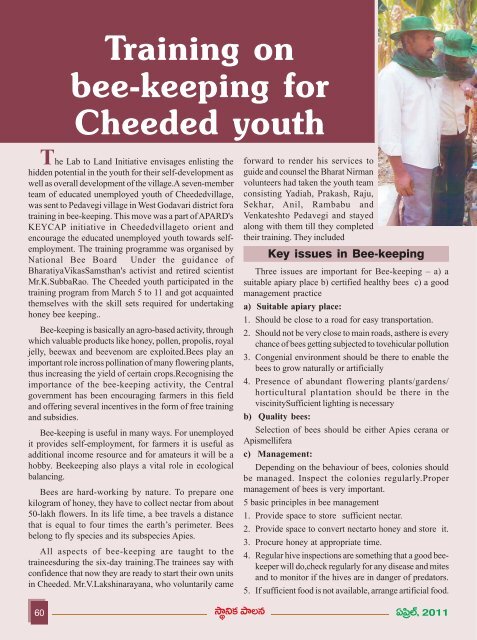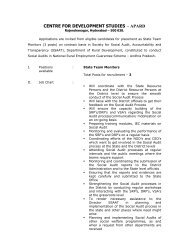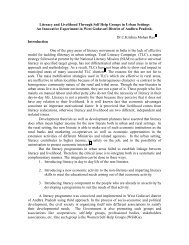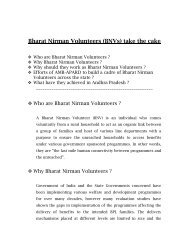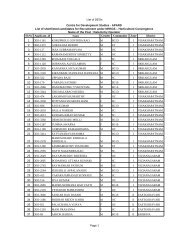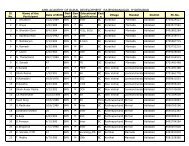April - Andhra Pradesh Academy of Rural Development(APARD)
April - Andhra Pradesh Academy of Rural Development(APARD)
April - Andhra Pradesh Academy of Rural Development(APARD)
Create successful ePaper yourself
Turn your PDF publications into a flip-book with our unique Google optimized e-Paper software.
60<br />
Training on<br />
bee-keeping for<br />
Cheeded youth<br />
The Lab to Land Initiative envisages enlisting the<br />
hidden potential in the youth for their self-development as<br />
well as overall development <strong>of</strong> the village.A seven-member<br />
team <strong>of</strong> educated unemployed youth <strong>of</strong> Cheededvillage,<br />
was sent to Pedavegi village in West Godavari district fora<br />
training in bee-keeping. This move was a part <strong>of</strong> <strong>APARD</strong>'s<br />
KEYCAP initiative in Cheededvillageto orient and<br />
encourage the educated unemployed youth towards selfemployment.<br />
The training programme was organised by<br />
National Bee Board Under the guidance <strong>of</strong><br />
BharatiyaVikasSamsthan's activist and retired scientist<br />
Mr.K.SubbaRao. The Cheeded youth participated in the<br />
training program from March 5 to 11 and got acquainted<br />
themselves with the skill sets required for undertaking<br />
honey bee keeping..<br />
Bee-keeping is basically an agro-based activity, through<br />
which valuable products like honey, pollen, propolis, royal<br />
jelly, beewax and beevenom are exploited.Bees play an<br />
important role incross pollination <strong>of</strong> many flowering plants,<br />
thus increasing the yield <strong>of</strong> certain crops.Recognising the<br />
importance <strong>of</strong> the bee-keeping activity, the Central<br />
government has been encouraging farmers in this field<br />
and <strong>of</strong>fering several incentives in the form <strong>of</strong> free training<br />
and subsidies.<br />
Bee-keeping is useful in many ways. For unemployed<br />
it provides self-employment, for farmers it is useful as<br />
additional income resource and for amateurs it will be a<br />
hobby. Beekeeping also plays a vital role in ecological<br />
balancing.<br />
Bees are hard-working by nature. To prepare one<br />
kilogram <strong>of</strong> honey, they have to collect nectar from about<br />
50-lakh flowers. In its life time, a bee travels a distance<br />
that is equal to four times the earth’s perimeter. Bees<br />
belong to fly species and its subspecies Apies.<br />
All aspects <strong>of</strong> bee-keeping are taught to the<br />
traineesduring the six-day training.The trainees say with<br />
confidence that now they are ready to start their own units<br />
in Cheeded. Mr.V.Lakshinarayana, who voluntarily came<br />
forward to render his services to<br />
guide and counsel the Bharat Nirman<br />
volunteers had taken the youth team<br />
consisting Yadiah, Prakash, Raju,<br />
Sekhar, Anil, Rambabu and<br />
Venkateshto Pedavegi and stayed<br />
along with them till they completed<br />
their training. They included<br />
Key issues in Bee-keeping<br />
Three issues are important for Bee-keeping – a) a<br />
suitable apiary place b) certified healthy bees c) a good<br />
management practice<br />
a) Suitable apiary place:<br />
1. Should be close to a road for easy transportation.<br />
2. Should not be very close to main roads, asthere is every<br />
chance <strong>of</strong> bees getting subjected to tovehicular pollution<br />
3. Congenial environment should be there to enable the<br />
bees to grow naturally or artificially<br />
4. Presence <strong>of</strong> abundant flowering plants/gardens/<br />
horticultural plantation should be there in the<br />
viscinitySufficient lighting is necessary<br />
b) Quality bees:<br />
Selection <strong>of</strong> bees should be either Apies cerana or<br />
Apismellifera<br />
c) Management:<br />
Depending on the behaviour <strong>of</strong> bees, colonies should<br />
be managed. Inspect the colonies regularly.Proper<br />
management <strong>of</strong> bees is very important.<br />
5 basic principles in bee management<br />
1. Provide space to store sufficient nectar.<br />
2. Provide space to convert nectarto honey and store it.<br />
3. Procure honey at appropriate time.<br />
4. Regular hive inspections are something that a good beekeeper<br />
will do,check regularly for any disease and mites<br />
and to monitor if the hives are in danger <strong>of</strong> predators.<br />
5. If sufficient food is not available, arrange artificial food.<br />
kÕúìø£ bÕ\q @Á|æ˝Ÿ, 2011


